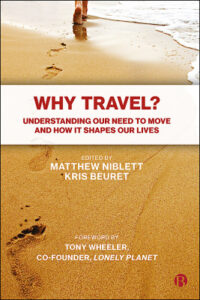Fewer young people in Europe are travelling: decline goes against global travel trends

The number of foreign trips made by Europeans aged 15-24 has fallen 1% per year for almost a decade. Image credit: The Road Less Travelled by Donna Smith licensed under creative commons via flickr.
23rd October 2015
Young Europeans are travelling considerably less than they were 10 years ago, according to a recent report.¹ The research indicates that foreign travel by young Europeans has declined around 10% in the last decade, a trend which is in opposition to steady global travel increases. A significant proportion of the decline can be explained by demographic changes: the population of Europeans aged 15-29 has decreased over the last decade due to Europe’s falling birth rate. But this population change accounts for only some of the decline in travel (the population decrease is around 6.5% compared to 10% drop in travel).² Lack of disposable income following the economic crash and increasing youth unemployment may also have contributed to the reduction in youth travel.
Recent research from the UK has also found changes in the travel behaviour of young people. For example, the Independent Transport Commission’s On the Move: Road and Rail Travel Trends research has found that car use amongst the under 30s has declined, particularly for business travel and within/between cities.³ The attitudinal research indicates that these changes are in large part due to economic concerns over the costs of owning a car, as well as convenience and availability of alternative modes of transport, and young people’s preference for using communications technology whilst travelling and to assist in travel planning.
Young Europeans as a demographic group have historically been relatively likely to travel and although this still remains the case, travel amongst other groups – older travellers and those from non-Western countries – is greatly increasing. As different groups tend to have different travelling motivations, habits and preferences, these broad trends can have huge impacts on the travel industry. The popularity of different destinations, attractions, and accommodation types will all be affected and the industry will need to respond to these changes. Likewise, government policy and infrastructure decisions also need to respond to changing behaviour trends. Within the UK, forecasts for domestic travel by road and rail have proved to be inaccurate, not predicting the drop in car ownership and increase in rail use by younger people, and this could potentially have large impacts on the effectiveness of policy choices.
Understanding why people travel is of huge importance in making better decisions about travel, whether than be within the tourist industry or national and local transport and infrastructure decisions. These issues are a central concern to the Independent Transport Commission’s Why Travel? Project, which aims to understand better our motivations for travel from a broad range of perspectives. The project looks at psychological and biological drivers as well as the economic, cultural and social structures we have created that all enable, control and shape our travel behaviour. Ultimately, this deeper understanding will help us to make better decisions in future regarding human travel and transport, and the myriad areas of life which travel touches on. For more information on the project, including news and expert views, see www.whytravel.org.
¹According to a special evaluation of the World Travel Monitor® from IPK International that was commissioned by ITB Berlin: http://www.4hoteliers.com/news/story/14930
²2007 statistics: http://ec.europa.eu/eurostat/statistics-explained/index.php?title=Archive:Youth_in_Europe&oldid=214791#Further_Eurostat_information
2014 statistics: http://eur-lex.europa.eu/resource.html?uri=cellar:d4b27e70-5b8a-11e5-afbf-01aa75ed71a1.0001.05/DOC_1&format=PDF
³This research project, undertaken by the ITC, ORR and RAC, has resulted in two reports so far, examining the trends shown by travel data and attitudinal research which uncovers some of the reasons behind these changes. http://www.theitc.org.uk/docs/47.pdf and http://www.theitc.org.uk/wp-content/uploads/2015/07/ITC-ORR-Road-Rail-Attitudinal-Report-Final.pdf


